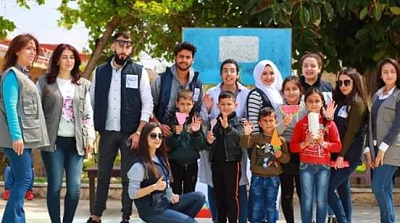One of the active voluntary teams that has successfully contributed to social, cultural and civil activities in the country is “Karoyat”, which is one of the “Peace Makers” civil society associations working in Lattakia province.
The team includes 32 youths from different Syrian provinces and who are students of various faculties at Tishreen University in Lattakia.
Fatima Ismael, the facilitator of Karoyat team, told the Syriatimes e-newspaper that volunteers in the team have different academic and professional backgrounds.
They managed in less than two years to carry out a number of distinguished activities in the domains of art, medicine, sport and heritage that meet the needs of youths, children and persons with disabilities.
The team’s main objective is to communicate with the society’s different categories to discuss their needs by involving them in effective community activities that will provide psychological support for targeted people and develop the youths’ skills in a variety of artistic and craft fields, she underscored.
 Miss Ismael pointed out that since its establishment, the team has carried out a number of activities including awareness campaigns as well as initiatives in cooperation with various civil society associations in Lattakia province marking some occasions such as the World Tourism Days and the International Day for the elimination of violence against women.
Miss Ismael pointed out that since its establishment, the team has carried out a number of activities including awareness campaigns as well as initiatives in cooperation with various civil society associations in Lattakia province marking some occasions such as the World Tourism Days and the International Day for the elimination of violence against women.
The team also took part in “our heritage” campaign, held by the “Peace Makers” civil society association in Lattakia on the occasion of the world Heritage Day. It performed a number of theatrical, dancing, singing and fashion shows that represent the Syrian tangible and intangible heritage in all the Syrian provinces.
The team’s activities also included an environmental event during which trees were decorated in some streets and messages calling for supporting women were written on them by passers-by .
It is noteworthy that the team has participated in certain events that target people with special needs in order to provide psychological support for them and for their families.
Interviewed by Rawaa Ghanam

